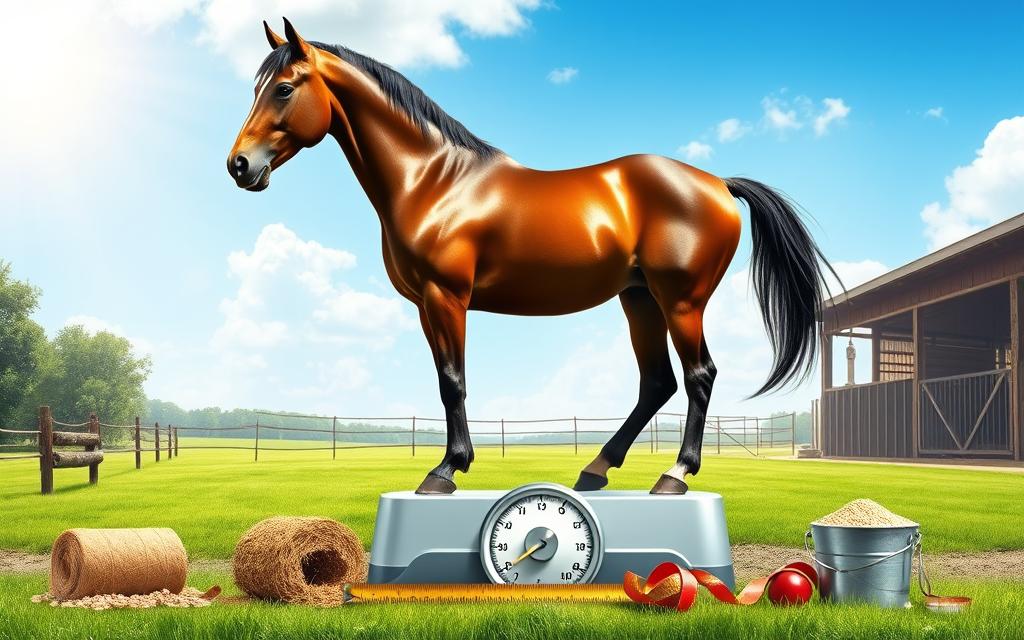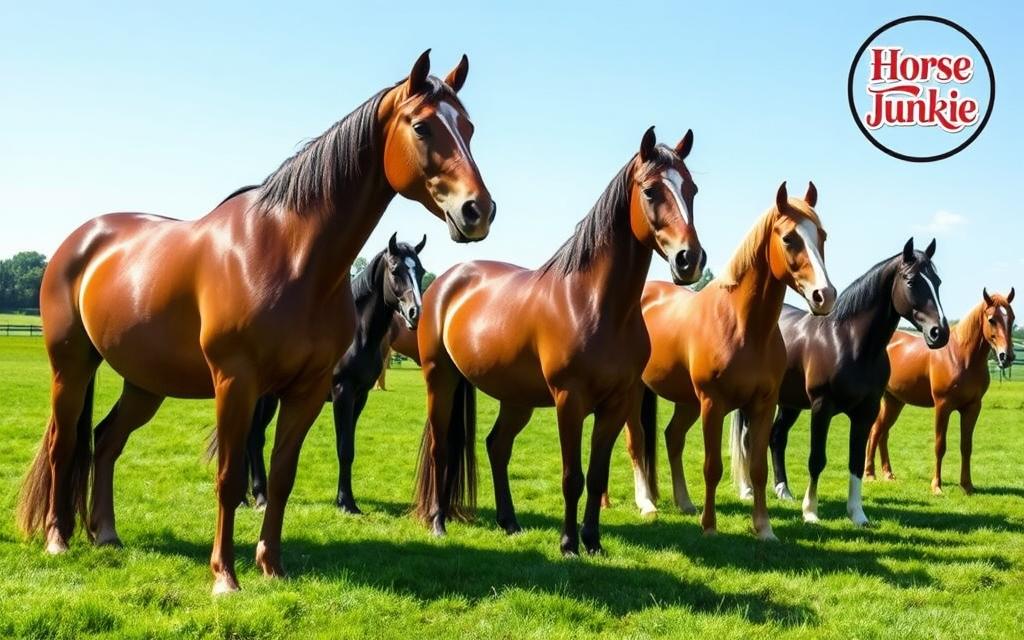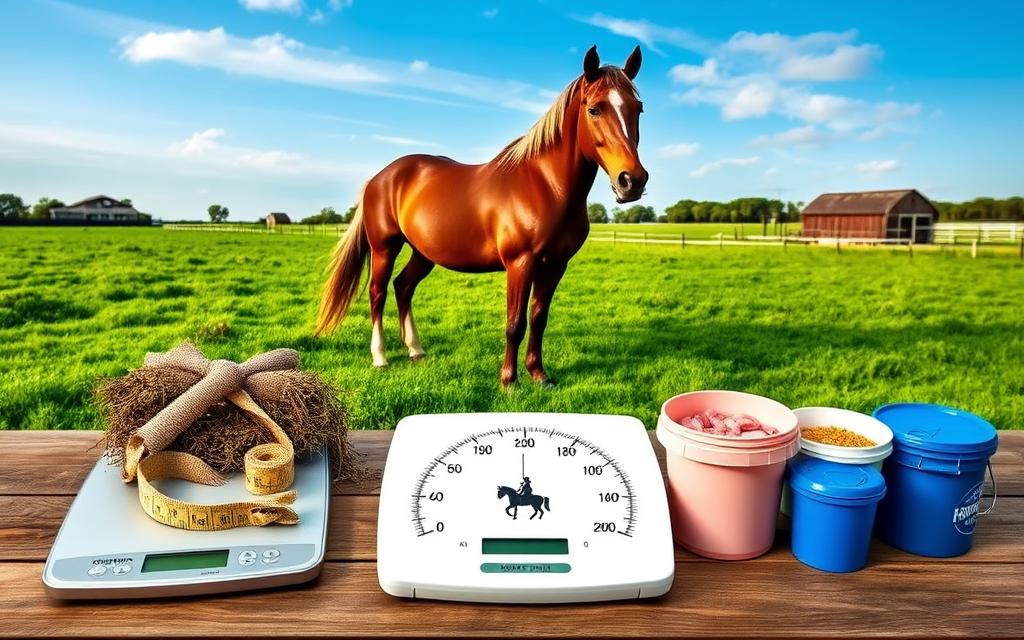Large Horse Weights: How Much Do They Tip Scales?

Ever thought about how much large horses weigh and why it matters? Their weight is key to their health and how well they perform. Knowing the average weight helps us feed, exercise, and care for them right.
We’ll look at different weight groups and what affects a horse’s weight. Things like breed, age, diet, and health all play a part. Let’s uncover the truth about the weight of big horses.
Key Takeaways
- The average horse measures between 13.3–17.3 hands tall, depending on the breed.
- Horses can weigh anywhere from 300–1,000 kg based on size, breed, and other factors.
- Heavy or draft horses typically weigh between 1,800 to 2,200 pounds.
- Regular weight assessments are crucial for monitoring a horse’s health and performance.
- Understanding weight classifications helps us manage our horses’ diets and exercise regimens effectively.
Understanding Horse Weight Categories
Knowing the different horse size and weight categories is key for horse owners and fans. Horses come in various sizes and weights, depending on their breed, purpose, and genetics. By grouping horses by size and weight, we can meet their unique care and management needs.
Differentiating Between Large and Small Horses
Horses are often divided into large and small categories. Large horses are over 14.2 hands tall. Those under this height are called ponies. Their size affects their suitability for riding and work.
Common Weight Classifications
Here are the common weight ranges for horses:
- Ponies: Weigh between 300 and 800 pounds.
- Light Horses: Usually weigh 900 to 1,400 pounds, like Arabians.
- Large Horses: Fall between 1,500 and 2,500 pounds, including drafts like Clydesdales and Belgians.
Knowing these horse weight categories helps us provide the right care and training. It’s crucial for their health and performance.
Factors Influencing a Large Horse’s Weight
The weight of large horses is influenced by many factors. Breed characteristics are a big part of it. Knowing these factors helps us take better care of our horses.
Breed Variations
Breed differences are key when it comes to horse weight. Each breed has its own weight range, thanks to genetics and body shape. For example, Clydesdales and Percherons are very heavy, often over 1,800 pounds.
On the other hand, Thoroughbreds are much lighter, usually around 1,100 pounds. So, a horse’s breed greatly affects its weight.
Nutrition and Diet
Nutrition and diet are also very important for a horse’s weight. A balanced diet helps them stay healthy. Horses need hay, grains, and supplements based on their age and activity level.
For example, young foals need more protein for their fast growth. Ignoring their dietary needs can cause weight problems, affecting their health and performance.
Age and Health Conditions
Age and health also play a big role in a horse’s weight. Young horses, or weanlings, grow fast. Yearlings should be about half the weight of an adult horse.
By four years old, horses usually reach their full adult weight. Health issues, like metabolic disorders, can make it hard to manage their weight. Regular health checks are important to keep our horses at a healthy weight.

Average Weights of Various Large Breeds
Knowing the average weight of different horse breeds is key for owners and fans. Each breed has its own traits that influence their weight. We’ll look at the average weights of several large horse breeds. This will help us see their diversity and what they need in care.
Draft Horses
Draft horses are among the heaviest. They usually weigh between 1,800 to 2,200 pounds. Clydesdales and Percherons are well-known for their strength and size. Their weight shows their build, making them great for heavy work.
Warmbloods
Warmbloods, like Dutch Warmbloods, weigh between 1,200 to 1,500 pounds. They’re known for being versatile and are used in many equestrian sports. Knowing their average weight helps us plan their nutrition and care.
Thoroughbreds
Thoroughbreds, famous in racing, weigh about 1,000 to 1,100 pounds. They may be lighter than draft breeds, but their athletic build and speed make them top racers. Understanding their weights helps us see their fitness and racing skills.
Weight Range of Specific Large Horse Breeds
Exploring specific large horse breeds shows us the importance of knowing their weight ranges. This knowledge is key for their care and management. Each breed has unique traits, especially in their weight, which affects their health and performance.
Clydesdales
Clydesdales usually weigh between 1,545 to 1,773 pounds. Known for their strength and versatility, they’re used for heavy work and riding. Their size and build make them a hit with horse lovers.
Percherons
Percherons typically weigh 1,876 to 2,094 pounds. They’re famous for their strength and endurance. These horses do well in draft work and competitive driving, making them popular in the equestrian world.
Shires
Shire horses are among the heaviest, weighing 1,545 to 2,645 pounds. Their size and gentle nature make them great for farm work and as pets. Knowing their weight range helps owners manage their diet and health properly.

Importance of Weight in Horse Health
Keeping our horses at a healthy weight is key for their well-being. We use body condition scoring to check their fat levels and spot health risks. Regular checks on their weight help them stay healthy and active.
Body Condition Scoring
Body condition scoring (BCS) rates horses from 1 to 9. Score 1 means they’re too thin, and 9 means they’re too fat. Scores of 4 to 6 are ideal. This range keeps them healthy and avoids weight-related problems.
Higher-weight Risks
Higher-weight horses face big health risks like laminitis and Equine Metabolic Syndrome. These issues can harm their quality of life and performance. We need to watch for signs of too much weight to prevent hoof and joint problems.
Underweight Concerns
Underweight horses have their own health challenges. They often have weak immune systems, making them prone to infections. We must feed them right and exercise them regularly to help them stay healthy. Taking care of their weight is crucial for their happiness and long life.

How to Weigh a Horse Accurately
We all know how crucial it is to keep an eye on our horse’s weight. This is key for their health and performance. There are several ways to weigh a horse accurately, each with its own benefits and drawbacks.
Using a Livestock Scale
The most accurate way to weigh a horse is with a livestock scale. These scales give us real-time weight readings. They are perfect for making sure our horse’s weight is recorded correctly. Although they might not always be easy to find, they make weight tracking a breeze.
Estimating Weight by Measurement
Without a livestock scale, we can still estimate a horse’s weight. We can use a weight tape made for horses. Wrap it around the girth area for a quick weight guess. The formula to figure out the weight is:
Heart Girth x Heart Girth x Body Length / 300 = Body Weight in lbs.
This method is best for average-sized horses, about 16 hands tall and 1,000 lbs. However, it’s not always accurate for ponies, young horses, or big draft breeds. To get the most accurate results, we should measure monthly. But if we notice big changes in weight, we should check more often, like weekly or daily.
For foals or young horses, we can use special formulas for better weight estimates. Keeping a close eye on their weight helps us adjust their diet and care. This keeps them healthy and performing well.

Impact of Weight on Horse Performance
The link between weight and horse performance is key for better equestrian activities. Knowing how weight changes can affect speed and endurance helps us train and compete smarter.
How Weight Affects Speed
In equestrian sports, weight has a big impact on speed. Heavier horses often struggle. Studies show that horses with more rider weight can be less agile, affecting their performance in events.
Horses with heavier riders also show more pain and discomfort. This can slow them down and make them less responsive. It’s crucial to match the rider’s weight with the horse’s to ensure the best racing conditions.
Influence on Endurance
Weight is also important for endurance. Heavier horses may tire more easily, especially in long rides. The size of the girth area and the horse’s shape can affect their lung capacity.
This, in turn, impacts how well they can carry their weight. When training, we need to make sure horses are ready for their tasks. We must consider their weight and build to improve their performance.

Weight Management Tips for Large Horses
Managing the weight of large horses needs a careful plan. This plan should cover nutrition and exercise. It’s key to keep our horses healthy and full of energy. The right diet and exercise help meet their needs and keep them active.
Nutrition Guidelines
It’s important to feed large horses the right amount to avoid too much weight. We should give them a diet rich in forage but watch the calories. Here are some tips:
- Focus on forage: Choose high-quality hay that’s good for them but not too calorie-dense.
- Monitoring calories: Watch how many calories they get each day. Adjust their food as needed to keep them at a healthy weight.
- Utilizing fat scoring systems: Use the 0-5 or 1-9 fat scoring systems to check their condition regularly.
- Consult with professionals: A vet or equine nutritionist can create a diet plan that fits each horse’s needs.
Exercise Routines
Regular exercise is key to keeping large horses fit and managing their weight. Domesticated horses don’t move as much as wild ones, which can lead to fat gain. Here’s how to keep them active:
- Brisk walks and steady trots: These activities help burn calories and reduce fat.
- Increased activity: Try longer walks and varied terrain to boost their fitness.
- Monitoring signs of distress: Watch for digital pulses to catch early signs of laminitis, especially when starting new exercises.
- Grazing management: Use strip grazing or a grazing muzzle to limit grass intake while still allowing them to move.

The Role of Veterinarians in Weight Assessment
Veterinarians are key in keeping our horses healthy, especially when it comes to weight. Regular visits help us catch weight problems early. With a vet’s help, we can keep our horses at their best weight.
Regular Check-Ups
Regular vet visits let us check our horses’ weight and health. Vets look at many things, like:
- Nutritional needs based on current weight and condition
- Adjustment of feeding strategies as needed
- Detection of any underlying health issues that may impact weight
By getting regular vet checks, we can keep our horses healthy and avoid big health problems later.
Weight Monitoring Tools
Vets use many tools to check weight accurately. Direct weighing is best, but not always easy. Luckily, we can use body measurements and other tools like:
- Weigh tapes designed for estimating weight
- Body condition scoring systems, like the Henneke scale
- Mobile apps that assist in weight estimations based on specific horse breeds
These tools help us monitor our horses’ weight. Talking to equine experts helps us make smart choices for our horses’ weight.

Understanding Weight Loss in Large Horses
Weight loss in large horses can come from many factors. It’s key to know these causes to manage their weight well. Keeping an eye on their body condition and diet is crucial for their health.
Common Causes
Several issues can lead to weight loss in large horses. Some common causes include:
- Health Issues: Medical conditions can cause unexpected weight loss, needing a vet check.
- Stress: Changes in environment, routine, or friends can affect a horse’s appetite and eating habits.
- Inadequate Feed Availability: Horses need a steady food supply; not enough can cause weight loss.
- Diet Quality: The quality of hay and feed is important; low-quality may lack needed nutrients.
- Age: Older horses might find it harder to manage their weight due to dental or metabolic changes.
When to Consult a Vet
If our horses lose weight quickly or show other concerning signs, we should see a vet. Watching their overall health and behavior is important. Regular vet visits help manage their health and ensure they get the right diet.
Myths and Misconceptions About Horse Weight
Understanding horse weight can be tricky, with many myths around. These myths can harm a horse’s health and performance. One big myth is that a horse’s height alone decides its weight. But, many factors really matter.
We need to know what’s the right weight for a horse. And we must clear up common myths.
Debunking Weight Myths
Many think bigger horses can carry more without issue. But, guidelines say a horse can only pull up to six times its own weight. This rule doesn’t work for all breeds.
Another myth is that the weight of what a horse pulls doesn’t count. For example, a 1,900-pound horse can pull a 3,145-pound carriage. This doesn’t mean the horse’s weight doubles. Knowing these myths helps us manage a horse’s weight better.
The Truth About Ideal Weight
When talking about the right weight for a horse, we must look at its breed, size, and purpose. Draft horses usually weigh between 1,400 and 2,000 pounds. This is important for jobs like transportation.
The horse’s fitness and bone structure also matter, especially for bigger riders. Knowing these things helps us care for our horses better.
Conclusion: Why Knowing Horse Weight Matters
Knowing a horse’s weight is key to their health and happiness. We found that many riders are at the right weight for their horses. But, it’s important to check weight often because too much weight can hurt horses.
More than 32% of riders are too heavy for their horses. This shows we need to focus on keeping our horses healthy.
Recap of Key Points
Keeping the rider-to-horse weight ratio under 10% is crucial. Horses can handle up to 20% of their body weight without stress. Knowing both rider and horse weights is important.
We talked about how diet and exercise help manage horse weight. This keeps them healthy and avoids obesity problems.
Encouragement for Better Management
As horse owners, we must watch our horses’ weight closely. We should adjust their diet and exercise to keep them healthy. Learning about what affects their weight helps us keep them happy and strong.
Good management not only improves their performance but also strengthens our bond with them.
FAQ
How much do large horses weigh?
What is the average weight of a horse?
What factors influence a large horse’s weight?
How do I differentiate between large horses and smaller ponies?
What is the weight range for specific large horse breeds like Clydesdales?
How does a horse’s weight affect its health?
What methods can I use to weigh my horse accurately?
Can a horse’s weight impact its performance in competitions?
What are effective weight management tips for large horses?
Why is it important to consult a veterinarian regarding horse weight?
What are the common causes of weight loss in large horses?
Are there common myths about horse weight?
Source Links
- Horse Height & Weight: A Guide
- How Much Does a Horse Weigh?
- A Comprehensive Guide on How Much Does A Horse Weigh
- How Much Does a Horse Weigh? — The Equine Institute
- How much does a horse weigh? (Fun facts, calculator, FAQs)
- How much does a horse weigh?
- How Much Does a Horse Weigh? Find Out Now!!!
- How Much Does a Horse Weigh? | Strathorn Farm Stables
- How much does a horse weigh? | Dream Horse
- How Heavy Is A Full-Grown Horse? [Stats About How Much Horses Weigh]
- Lion & Safari Park | WHY IS THERE A WEIGHT LIMIT FOR HORSEBACK RIDING?
- How Much Does a Horse Weigh? With Breed Chart | PangoVet
- How Much Does a Horse Weigh | How Much Does a Average Horse Weigh
- Horse Weight Factors and Importance | American Horse Trails
- Caring for the higherweight horse
- How to Weigh Your Horse
- Learn to Calculate a Horse’s Approximate Weight
- Estimating actual and ideal bodyweight of adult horses
- The Effect of Rider Weight on Horse Performance
- Let’s Talk About Weight & Horses
- Landmark study addresses effects of rider weight on equine performance – World Horse Welfare
- Weight: is your horse the right weight? – World Horse Welfare
- Weight Management Tips for your horse
- Equine new placement only (proof).indd
- Evaluation of the Accuracy of Horse Body Weight Estimation Methods
- Equine Body Condition: From Too Fat to Too Thin to Just Right
- Weight: is your horse the right weight? – World Horse Welfare
- 5 Steps for Equine Weight Loss
- Let’s Talk About Weight — Charleston CARES
- The great weight debate: How heavy is too heavy? – Horsetalk.co.nz
- How Much Does a Horse Weigh | How Much Does a Average Horse Weigh
- The Rider Weight Debate: What can the latest research tell us? – Good Horse



